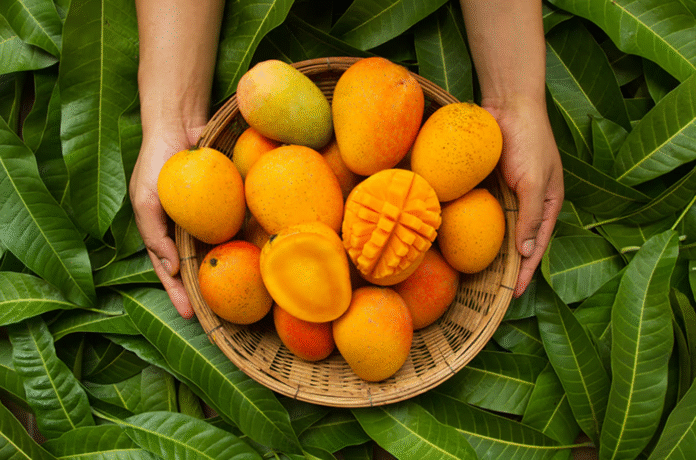Mangoes for Diabetes Control: What Science Really Says
The big question many Indians ask every summer is: “Are mangoes safe for people with diabetes?” For years, the common belief was that mangoes often called the “king of fruits” should be avoided by anyone managing blood sugar levels. But new studies are challenging that myth.
Recent Indian clinical trials suggest that mangoes for diabetes control may not only be safe in moderation but could even support better blood sugar and metabolic health when eaten correctly.
Mango Myths and Misconceptions
For decades, diabetologists have had to answer endless questions about mangoes. Some patients believe they must completely avoid the fruit, while others think overindulging could even help reverse diabetes. The truth is somewhere in between.
Dr. Rahul Baxi, a leading Mumbai-based diabetologist, explains that many of his patients see spikes in glucose levels after mango season not because mangoes are inherently harmful, but because of overindulgence. Portion control, he stresses, is the real key.
What the Latest Indian Studies Reveal
Two landmark studies conducted in India have flipped conventional wisdom:
1. Pilot Study on Glycemic Response
Published in the European Journal of Clinical Nutrition, this study monitored 95 participants who consumed popular mango varieties Safeda, Dasheri, and Langra. Results showed that these mangoes produced a similar or lower glycemic response compared to white bread.

Participants with type 2 diabetes who ate mangoes experienced smaller post-meal glucose fluctuations, which is beneficial for long-term metabolic health.
2. Randomised Controlled Trial in Delhi
Another trial at Fortis C-DOC hospital, funded by the Indian Council of Medical Research, replaced breakfast bread with 250g of mango for 35 type 2 diabetes patients.
The results were remarkable:
-
Lower fasting glucose levels
-
Improved HbA1c (average blood sugar marker)
-
Reduced insulin resistance
-
Decreased waist circumference
-
Better HDL (good cholesterol) levels
Prof. Anoop Misra, lead researcher, summed it up:
“Small, supervised doses of mango in place of carbohydrates showed clear benefits without adverse effects. But moderation is key, this is not a license for unlimited mango feasts.”
Why Mangoes Might Help Diabetes Management
So why does this work? Mangoes, despite being sweet, contain:
-
Natural fibre that slows glucose absorption.
-
Polyphenols and antioxidants that improve insulin sensitivity.
-
Vitamins A, C, and E that support metabolic health.
Replacing refined carbs like bread with mangoes provides nutrients plus lower sugar spikes, making it a smarter option than once thought.
Portion Control: The Golden Rule
Experts stress that mangoes for diabetes control are safe only when eaten in moderation.
👉 Dr. Misra explains: If your daily diet is 1,600 calories, a small mango (about 250g = 180 calories) should replace carbs like bread, not add to them.
👉 Dr. Baxi advises his patients to eat half a portion (15g carbs) once or twice a day, ideally between meals, paired with protein or fibre, and never as a sugary juice or milkshake.

The Cultural Power of Mangoes in India
Beyond its health impact, the mango is deeply rooted in Indian culture. Known as the “fruit of diplomacy,” mangoes have often been exchanged as gifts between leaders.
Former Indian Ambassador Ronen Sen once famously presented a basket of mangoes to a U.S. Secretary of Agriculture, symbolizing India’s rich produce and political goodwill.
Mango festivals across Indian cities celebrate its 1,000+ varieties, each with unique flavors from the sweet Alphonso of western India to the tangy Himsagar of the east.
Historian Pushpesh Pant notes:
“Good mangoes are not just food, they are adornments like jewelry.”
This cultural reverence adds another layer to why mangoes remain irresistible, even for those with diabetes.
A Balanced Approach to Mango and Diabetes
The message from the latest research is clear: mangoes are not the enemy for people with type 2 diabetes. When consumed wisely, they may actually improve metabolic health.
The bottom line:
-
🍋 Moderation is key – replace carbs, don’t add them.
-
🍋 Portion control matters – stick to small servings.
-
🍋 Avoid sugary forms – no juices or milkshakes.
-
🍋 Pair smartly – combine with protein or fibre.
Conclusion
The evidence is growing: mangoes for diabetes control may not just be safe, but potentially beneficial when eaten with moderation and under proper supervision. Instead of being labeled forbidden, mangoes deserve a place in balanced diets, especially when they replace less healthy carbs.
For millions of Indians managing type 2 diabetes, that means the beloved summer fruit can be enjoyed guilt-free, with science finally offering reassurance.

